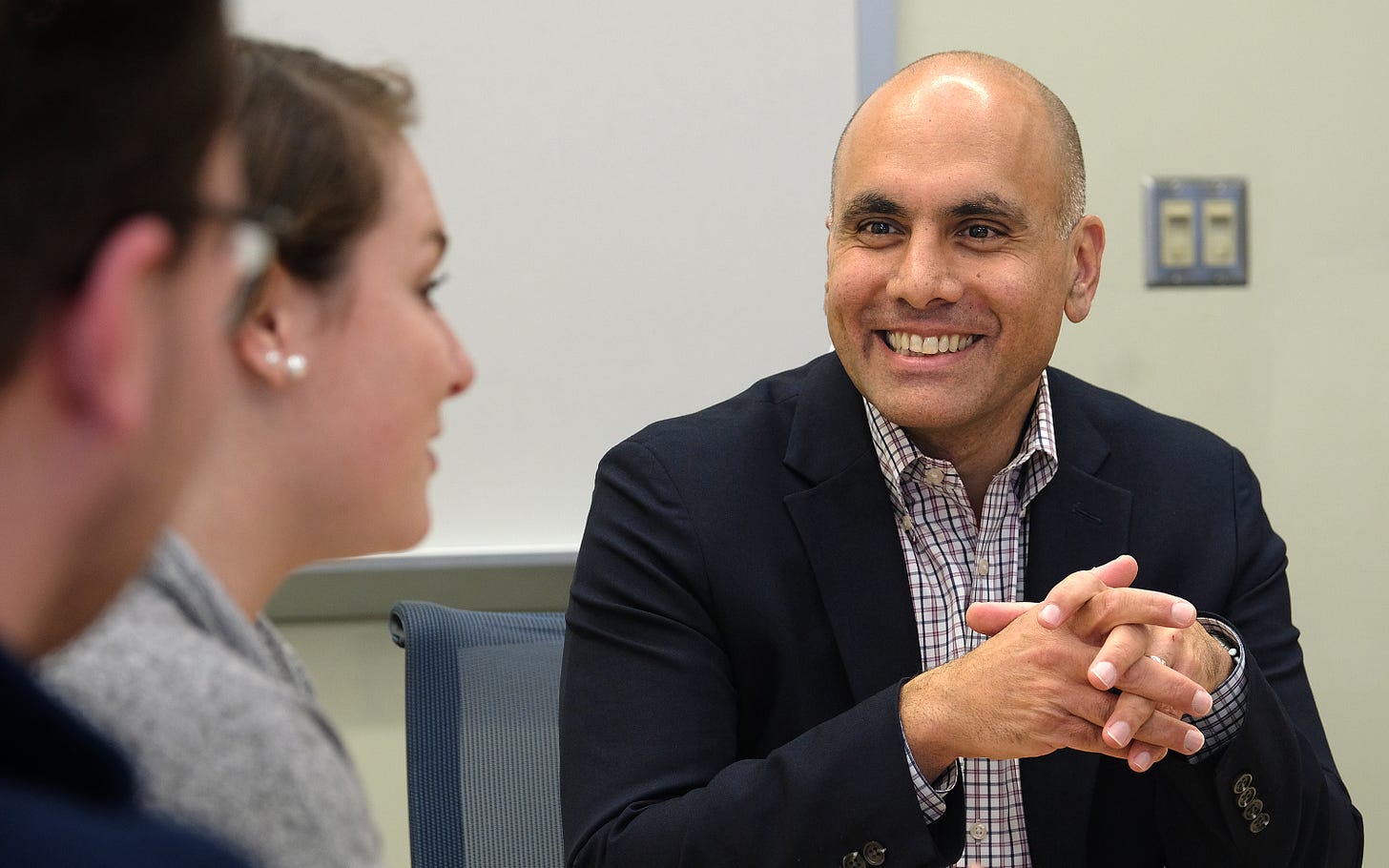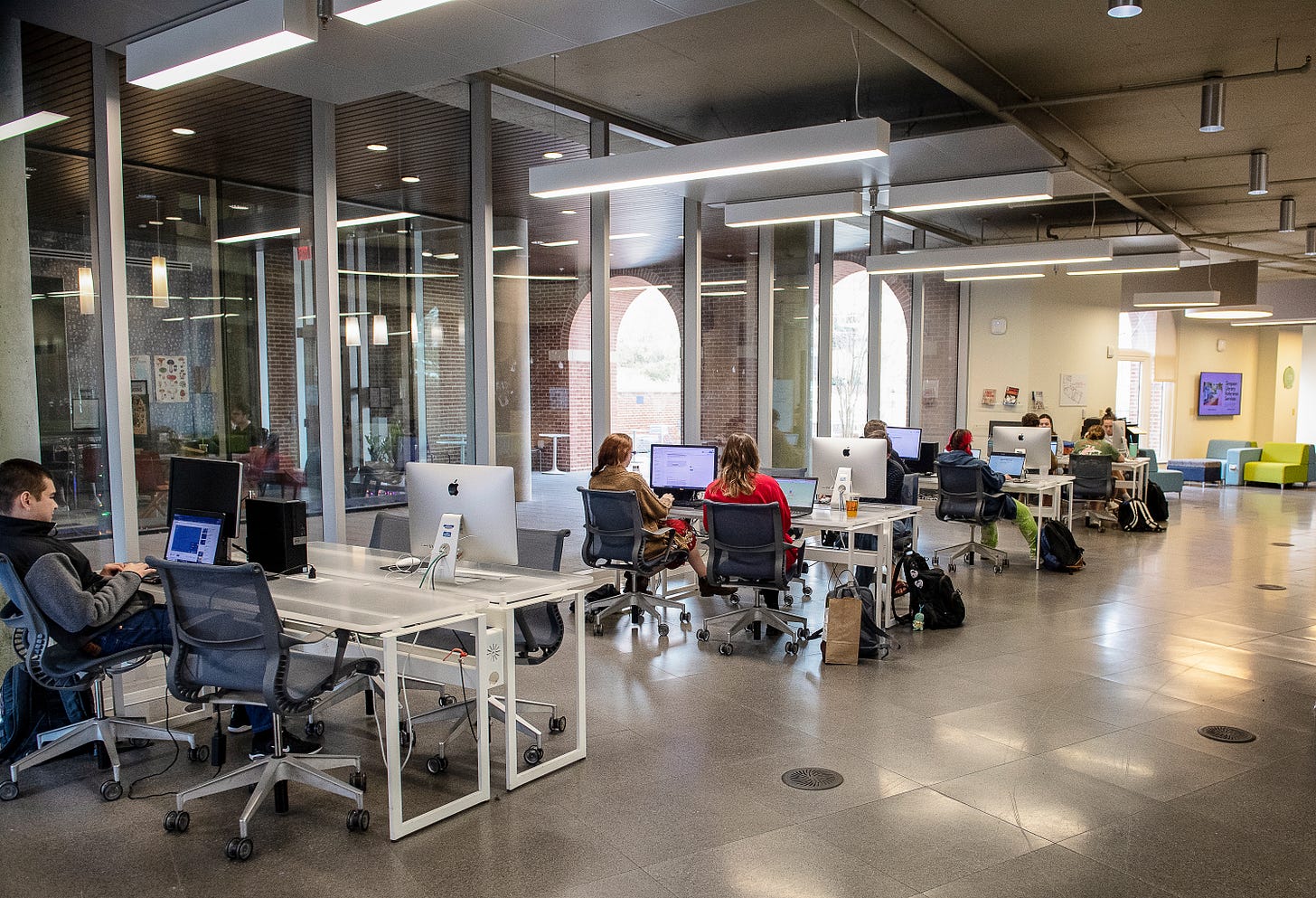UMW Poised to Be a Leader in 'AI Pluralism'
Anand Rao will lead the newly launched Center for AI and the Liberal Arts at UMW.
By Martin Davis
EDITOR-IN-CHIEF
Email Martin

Writing about artificial intelligence and the humanities for the New Yorker in April, D. Graham Burnett of Princeton University said that:
staggering transformations are in full swing. And yet, on campus, we’re in a bizarre interlude: everyone seems intent on pretending that the most significant revolution in the world of thought in the past century isn’t happening. The approach appears to be: “We’ll just tell the kids they can’t use these tools and carry on as before.” This is, simply, madness. And it won’t hold for long. It’s time to talk about what all this means for university life, and for the humanities in particular.
The University of Mary Washington is positioning itself to become one of the leaders in that discussion by launching the Center for AI and the Liberal Arts at UMW.
Professor Anand Rao will head this project and is himself an emerging leader in discussing how we “take the best of AI and the humanities and blend them together so that the humanities are shaping the growth of AI in an ethical and humanistic way,” Rao told the Advance in a phone interview.
Speaking on the Tech Unhinged podcast earlier this year, Rao said that “most AI systems are single-agent models — they take a very monolithic approach to development. The problem with this is that it contradicts everything we know about effective human reasoning,” which is most effective when we are working collaboratively and bouncing ideas off one another.
What the new center will promote instead is something called “AI pluralism.”
The challenge, Rao told the Advance, is to discover how we “incorporate AI literacy skills so that it supplements and doesn’t supplant critical thinking skills.”
This is a topic that Rao has been actively working to address the past couple of years. One result of this work was a course offered asynchronously this summer to all returning and incoming students. It was essentially “an intro to AI course,” Rao said. But it went beyond talking to students about AI.
Students created discussion boards and were engaged in vigorous discussions that forced them to wrestle with AI as a tool for learning. According to Rao, the course — which about 250 students registered for — received very favorable responses from students with the vast majority of them completing the work.
This fall, the university will offer three sections of a course titled AI and society. The courses will meet in person on Wednesdays, and for two hours online other days of the week.

Rao will be bringing in guest speakers who will discuss AI and the environment, and issues involving AI and copyright. Students will be required to build their own chatbots, learn to use no code-coding apps, and think about how they can use those things in separate settings.
“If we don’t get ahead of [AI] and talk about ethical and responsible use, than [students] won’t know the difference,” Rao told the Advance.
In the spring, the university will be offering two other AI infused classes, including one dealing with argumentation.
The course is structured, Rao says, “so students use AI tools to supplement their thinking. We then have these in-class discussions that are rigorous, forcing them to demonstrate that they’re not overly reliant on AI and can incorporate it responsibly.”
“I’m concerned about preparing our students for a world where business is incorporating AI tools,” Rao said. “They need to be ready for an AI world. AI’s not going away.”
Rao is envisioning the center as working beyond the confines of UMW’s campus.
A press release put out by the university this past week said that the center will support a range of initiatives, including:
Courses and Curriculum Development: New interdisciplinary classes that examine AI through the lenses of ethics, communication, digital studies and the humanities.
Student Projects and Research: Opportunities for students to engage in hands-on AI projects, including chatbot development, augmented debate and AI explainability.
Faculty Collaboration and Grants: Support for faculty research and grant proposals that explore AI’s impact on education, society and culture.
Public Events and Outreach: Workshops, guest lectures and community partnerships, including public workshops.
Seed money for the center was provided by Donna Gladis and her husband Steve, who contributed $100,000 toward getting the program off the ground.
Rao also credits UMW Provost Tim O'Donnell for his role in getting the center up and going.
For More Information
Center for AI and the Liberal Arts — Website
Anand Rao
Chat(GPT): Navigating the Impact of Generative AI Technologies on Educational Theory and Practice | Edited by Rao
Additional Publications
UMW Press Release about the Center
Will the Humanities Survive Artificial Intelligence? | The New Yorker
Podcasts
AI Pluralism: Why Diverse AI is Better AI | Tech Unhinged
AI in Education: Augmented Debate & AI Pluralism | Prof Anand Rao - regulatingai.org
Local Obituaries
To view local obituaries or to send a note to family and loved ones, please visit the link that follows.
Support Award-winning, Locally Focused Journalism
The FXBG Advance cuts through the talking points to deliver both incisive and informative news about the issues, people, and organizations that daily affect your life. And we do it in a multi-partisan format that has no equal in this region. Over the past year, our reporting was:
First to break the story of Stafford Board of Supervisors dismissing a citizen library board member for “misconduct,” without informing the citizen or explaining what the person allegedly did wrong.
First to explain falling water levels in the Rappahannock Canal.
First to detail controversial traffic numbers submitted by Stafford staff on the Buc-ee’s project
Our media group also offers the most-extensive election coverage in the region and regular columnists like:
And our newsroom is led by the most-experienced and most-awarded journalists in the region — Adele Uphaus (Managing Editor and multiple VPA award-winner) and Martin Davis (Editor-in-Chief, 2022 Opinion Writer of the Year in Virginia and more than 25 years reporting from around the country and the world).
For just $8 a month, you can help support top-flight journalism that puts people over policies.
Your contributions 100% support our journalists.
Help us as we continue to grow!
This article is published under Creative Commons license CC BY-NC-ND. It can be distributed for noncommercial purposes and must include the following: “Published with permission by FXBG Advance.”














